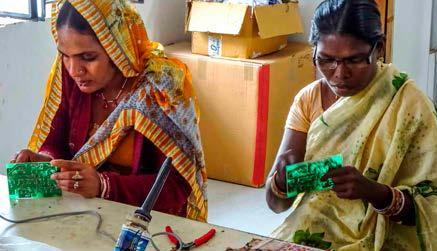
Renewable Energy: A Potent Tool For Women Empowerment In Rural India
While otherwise enjoying a phase of robust economic growth, India, unfortunately continues to be plagued by energy poverty. This is more pronounced in the rural regions, which are home to close to 70% of Indians.
Though the government has focused attention on rural electrification, there are still around 41 million houses implying approximately 300 million people with little or no access to electricity.
A major advantage that electricity generated from renewable sources has over that from fossil fuels is that it is about 15%-20% cheaper. This has huge significance in a developing economy like India where both accessibility and affordability are of equal importance.
Addition to renewables capacity will take electricity to far flung areas and bring it within the reach of the underprivileged masses. Renewable energy can thus act as a crucial tool in filling up the gaps of energy access through decentralized energy systems. Decentralized energy systems and off-grid solutions are in fact providing entrepreneurship opportunities for rural women who can be trained as solar engineers and improve their livelihood and relevance in society.
Access to energy has positive spill-over effects in terms of improved health, better education, alternate livelihood activities, increased productivity and increased safety among others. By providing access to renewable energy, people can shed their reliance on traditional sources like kerosene and wood fired cooking stoves, thus guaranteeing them a safer and healthier lifestyle.
Traditional fuels exacerbate environmental problems and lead to indoor pollution and respiratory diseases. The World Health Organization reports that in India around 500,000 deaths occur annually due to respiratory diseases caused by unclean cooking fuels. Women and children are undeniably the main victims of indoor pollution, hence access to renewable energy is a major boon to them.
One of the major ways in which renewable energy can empower rural women is by transforming the rural education scenario, powering more schools and thereby widening access to quality education. A majority of schools in rural India still lack access to electricity, and this is one of the primary reasons for low attendance, and often drop outs, especially amongst girls.
Electrified village schools have historically witnessed lower drop-out rates, higher test scores, and higher proportions of girls entering secondary education. If one changes the way education is imparted, this leads to students, especially girls forming better, newer ideas. If there is a solar rooftop on a school, there can be ICT solutions and students can learn through audio and visual means, rather than sticking to traditional forms of education.
Renewable energy enables a school to adopt solutions which are modern, transformative and futuristic, changing the landscape of how education is imparted, which will invariably affect girls more positively and empower them. Girls who are in this system will be better informed and more confident – equipped to make the most of opportunities that open up in front of them.
As per a McKinsey report, by 2035, 50% of energy generation will be through renewable sources so it is very likely that rural India will reap the benefits of this energy transition. Women, who spend hours in the dark looking for fuel and are not paid or recognized for this work while exposing themselves to potential violence will be the primary beneficiaries if renewable energy finds its way into rural households.
Renewable energy can also spur entrepreneurship – generating precious alternate means of livelihood for rural women. There are success stories, such as the Solar Grannies initiative where elderly rural women have been trained to become “solar engineers”, putting them on a path to self-sufficiency and heightened self-esteem while bringing light to their respective villages.
ReNew Power too has plans to launch a programme on similar lines – titled Urja Ambassador wherein it will train local women to handle operational maintenance of micro grids in remote villages, thereby providing an avenue for supplementary income.
Renewable energy can be the key to unlocking a sustainable future and catalysing the economic mainstreaming of women in villages. Steady access to clean energy at the grass-root level would enable women to run their business operations smoothly and in an environmentally-friendly manner. For example, perpetual lighting outdoors will enable them to work for longer hours outdoors and inside their home too.
Another noteworthy example is the successful implementation of a business model by Selco, which provides solar power equipment on instalment basis. Rural women are targeted wherein from a group of women, a leader is chosen who provides solar charged batteries to the rest on rent. These women, who are all business owners are able to afford payments on account of increased earnings through extended business hours. If similar programmes can be replicated across the country on a large scale the beneficiaries will multiply manifold.
Another way in which energy access helps improve quality of life is through the now ubiquitous cell-phones. The ability to power mobile phones has implications on productivity, market access and connectivity, leading to an improved life for women.
We can also draw inspiration from international success stories about empowered rural women helping spread renewable energy. As per the United Nations, Solar Sister is an award-winning social enterprise advancing women’s entrepreneurship to bring off-grid electricity and clean cooking solutions to underserved communities across Sub-Saharan Africa, which has significantly improved the living standards of rural women.
While rural women still form the pillars of the rural economy by being the primary ones engaged in agriculture, cattle-rearing, cooking and so on, their lack of power in decision-making has kept them on the backward trenches. Renewable energy interventions can help correct this social distortion by creating empowered women entrepreneurs who have a higher degree of power in decision making due to being economically independent. There is empirical evidence that clean energy access is linked to higher chances for women to earn better wages, contributes to reduction in gender-based violence and enables girls to complete primary education.
Wiser and wider application of renewable energy can unshackle the growth potential of rural women in India’s villages and help them enjoy a better quality of life. As capital costs decrease and efficiency rises, renewable energy is likely to find a higher degree of penetration in rural India, relieving households from the strangle of energy poverty. With unfettered energy access, the social, economic and health indicators of women are set to improve, making a perceptible difference to their living conditions and fast tracking their overall upliftment.
 The author is Chief Sustainability, CSR & Communication Officer at ReNew Power Ltd. A strong advocate of equal participation of women in economic activities, Vaishali Nigam Sinha drives the engagement, CSR and sustainability initiatives of ReNew Power under the ambit of ReNew India Initiative (RII). Vaishali has a Masters’ in Public Policy from Columbia University’s School of International and Public Affairs, where she was an American Association of University Women (AAUW) scholar.
The author is Chief Sustainability, CSR & Communication Officer at ReNew Power Ltd. A strong advocate of equal participation of women in economic activities, Vaishali Nigam Sinha drives the engagement, CSR and sustainability initiatives of ReNew Power under the ambit of ReNew India Initiative (RII). Vaishali has a Masters’ in Public Policy from Columbia University’s School of International and Public Affairs, where she was an American Association of University Women (AAUW) scholar.
Views of the author are personal and do not necessarily represent the website’s views.
















